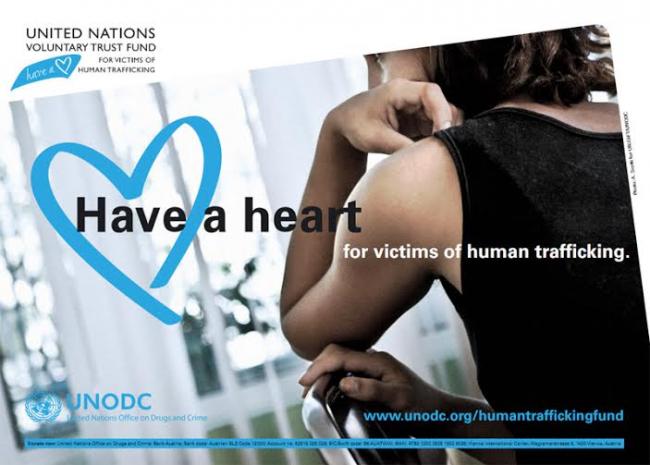15 Apr 2015, 06:22 am Print

Almost every nation in the world is affected by human trafficking either as a country of origin, transit, or destination. The victims are exploited in a range of different sectors, with some 53 per cent involved in sexual exploitation and 40 per cent in forced labor, according to 2011 figures.
In 2010, the UN established a Voluntary Trust Fund for Victims of Trafficking in Personsand the high-level event discussed the achievements of the Fund and the challenges it has faced over the past five years.
“The Fund helps to ensure that women, children and men who have been exploited by traffickers are identified and provided with the assistance, protection and support needed for their physical, psychological and social recovery,” said Yury Fedotov, the Executive Director of the UN Office on Drugs and Crime (UNODC).
The UN Special Rapporteur on Trafficking in Persons, Maria Grazia Giammarinaro, said that assistance is crucial “in ensuring the full access to an effective remedy for victims, including rehabilitation, reintegration and redress for any harm committed against them” and in preventing “re-victimization and re-trafficking of victims.”
However, in practice, trafficked persons are frequently left without remedies or the assistance necessary to start a rehabilitation or reintegration process, she added.
Giammarinaro stressed that a strong partnership with non-governmental organizations is necessary to effectively address the scourge. She strongly urged Member States to contribute generously to the UN Trust Fund.
“The role of the Trust Fund is crucial. It is not meant of course to replace state action. States have their obligations and have to fulfill their obligations in the field of victims’ right protection, including allocating adequate funding for NGOs,” she added.
The first three-year grant-cycle of the Fund ended last December and a total of 11 projects in Albania, Cambodia, Costa Rica, Czech Republic, France, Kenya , Israel, Moldova, Nepal, Nigeria and the United States received nearly $750,000 dollars.
Each year, some 2,000 victims benefitted from direct assistance, including provision of shelter, basic health services, vocational training and schooling, as well as psychosocial, social and economic support.
Fedotov said the continuing difficulties in raising money for the Trust Fund, despite its tangible achievements, remain a key challenge in providing meaningful assistance.
Since it was established, the mechanism has received just over $2 million in paid contributions from 19 Member States and some 30 private-sector donors, as well as individuals.
“While these contributions have been very gratefully received, they remain below the level of funding needed, and I hope we can rely on your support to ensure that the Trust Fund can have the reach and impact envisaged by the Global Plan of Action,” he said.
Two representatives of non-governmental organizations assisting victims of trafficking in persons in Nepal and Nigeria, Sunita Damuwar, President of the Board of Shakti Samuha, and Paul Adepelumi, Executive Director of the African Centre for Advocacy and Human Development (ACAHD), were among the participants of this high-level event.
Adepelumi explained that thousands of Nigerian girls work in the sex industry and that “many are found in Europe.” He added that the root causes of this human trafficking are “widespread poverty” and conflict.
Photo: UNODC
- Caught on camera: Two foreigners assaulted in Israel in an alleged racial attack
- Pakistan: Parents heartbroken after court sides with man accused of kidnapping minor Christian girl
- Pakistan: Trafficked 35 years ago, Bangladesh-born woman approaches court against FIA for offloading her from flight!
- Hindu tea worker found bound and bloodied in Bangladesh garden during general elections; investigation underway
- Brutal killing shakes Bangladesh: Hindu trader hacked to death ahead of polls





-1763561110.jpg)
